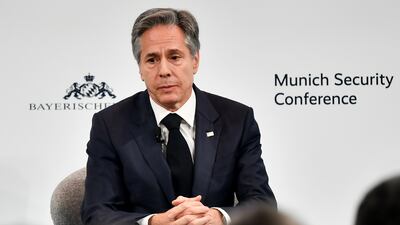The Chinese balloon that hovered above the continental US in an alleged spy attempt was sent to “surveil very critical, important military installations”, US Secretary of State Antony Blinken said on Sunday.
Mr Blinken spoke to ABC's This Week in a recorded interview just after Washington and Beijing diplomats met on Saturday for their first talks since US President Joe Biden ordered the shooting down of the alleged spy balloon two weeks ago.
Mr Blinken and Wang Yi, China’s most senior foreign policy official, held “very direct and candid” talks, a senior State Department official said.
“I condemned the incursion of the PRC (People’s Republic of China) surveillance balloon and stressed it must never happen again,” Mr Blinken said in a tweet.
Beijing denied that it uses spy balloons and said the device was for weather research. It accused Washington of sending its own espionage balloons over Chinese territory, which the US has denied.
The meeting occurred on the sidelines of international security talks in Munich, where Mr Blinken said Washington's allies expressed that they “appreciate” that the US “exposed” the programme.
“We are not the only ones on the receiving end of the Chinese spy balloons … So there's a real concern that I'm hearing here from other countries, from allies and partners alike, about this programme,” he said.
In a separate Sunday show interview on NBC's Meet the Press, Mr Blinken denied claims from Beijing that Washington has a cold war mentality.
After the balloon episode, Mr Blinken delayed a visit to China for meetings with senior government officials.
He added the US is working “to make sure, to the best of our ability, that competition doesn't veer into conflict or into cold war”.
“You can't reduce this to a bumper sticker or to a label,” he said.
















